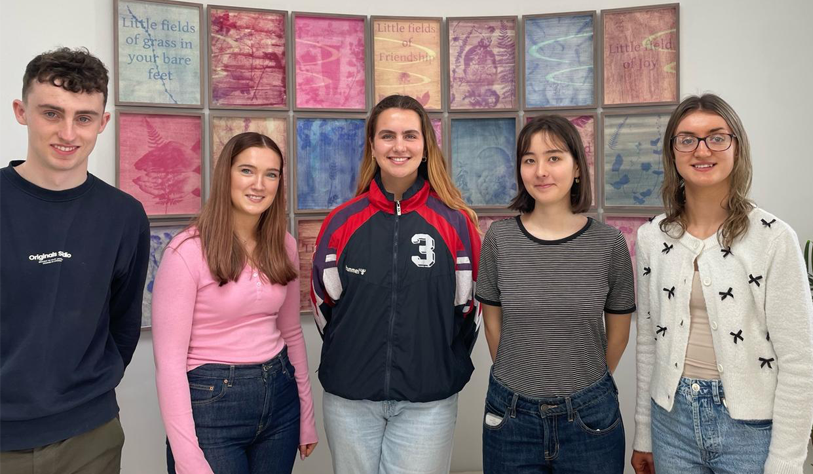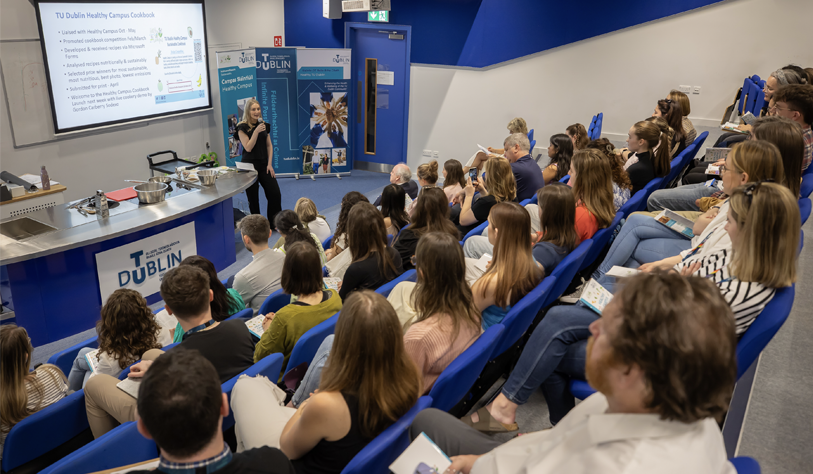Nourishing Communities: Empowering Change Through Food and Partnership

In the face of growing health disparities, food insecurity, and misinformation around nutrition, the Nourishing Communities project presents a meaningful response to one of today’s most pressing needs: equitable access to nutrition education and sustainable food practices.
Led by School of Biological Health and Sports Sciences lecturers Dr Aileen Kennedy and Dr Eileen O'Brien, the Students Learning with Communities + (SLWC+) project was a collaboration between Third-year Human Nutrition & Dietetics (TU870/3) students, and societal partners TU Dublin Healthy Campus, St Paul's CBS, CBS James Street, An Goirtín Hub, and UN Veterans, Arbour Hill. Sustainability Education Lead Dr Olivia Freeman also supported the students and project leads throughout the project.
Their project showcases the power of student-led engagement in tackling the intersection of public health, education, and sustainability. Across five unique sub-projects, the students partnered with local schools, community hubs, and TU Dublin’s own Healthy Campus programme to promote positive dietary habits within society and to break down barriers to healthy living.
Whether it was equipping teenage boys in a DEIS (Delivering Equality of Opportunity in Schools) secondary school with tools for better sports nutrition, empowering veterans with knowledge to combat chronic disease, or co-creating a University Healthy Campus Cookbook with students and staff or inspiring a programme of healthy eating with a mental health service provider, each project was deeply rooted in the pillars of TU Dublin’s Strategic Intent to 2030: People, Planet, and Partnership.
At its heart, the Nourishing Communities project localises the United Nations (UN) Sustainable Development Goals (SDGS), namely SDG 3: Good Health and Wellbeing, SDG 4: Quality Education, SDG 10: Reduced Inequalities, and SDG 11: Sustainable Cities and Communities. From Goirtín Hub’s care for mental health in the community to the practical workshops at local schools, the project didn’t aim to nourish bodies in the physical sense alone, rather it strengthened social connection, helped to build confidence among participants, and inspired pathways to lifelong health amongst participants.
Learning about nutrition in a fun way!
In one project, overseen by Dr Aileen Kennedy, students teamed up with Goirtín Hub to educate and inspire service users about healthy eating.
Based in Grangegorman, and part of the Health Service Executive’s (HSE) EVE programme, Goirtín Hub supports people with mental health challenges to live more independent, fulfilling lives by helping them achieve personal goals through centre and community-based activities. The service also encourages community involvement and the development of natural support networks.
The main challenge for their project was overcoming barriers to healthy eating for service users at Goirtín Hub. They aimed to develop workshops and resources to tackle issues such as low confidence in cooking, limited nutrition knowledge, and understanding portion sizes.
Speaking about the collaboration, Goirtín Hub Manager Peter Dunican said: “It was great that you met up with us a few weeks in advance and delivered a tailormade presentation to us. Everybody enjoyed the workshop and found it very informative”.
In turn participants valued supports to build practical skills in a way that felt achievable, but not overwhelming. By delivering hands-on, engaging sessions, the project team aimed to make healthy eating more accessible and realistic for everyone involved.
Speaking enthusiastically about the project, one Goirtín Hub service user said: “We had a wonderful afternoon and the tips they gave us are really useful to implement in our life."
Marching forward - healthy choices for Army Veterans
In another project overseen by Dr Eileen O’Brien, students teamed up with Irish United Nations Veterans Association (IUNVA), Arbour Hill, to promote healthy lifestyle choices among veterans.
IUNVA serves the interests of retired members of the Defence Forces who have served overseas on peacekeeping missions, offering tours, ceremonies, and a supportive drop-in space.
The student project sought to empower IUNVA Veterans with knowledge on nutrition and to highlight the health risk factors associated with chronic diseases, relevant to the cohort of their group.
The students aimed to empower veterans with practical nutrition knowledge and raise awareness of chronic disease risk factors. Their workshop covered cardiovascular health, exercise, alcohol, diabetes, food labels, and ultra-processed foods. Their teachings extended beyond the group, with members bringing home their brochure resource to share with family members and friends. The group also recorded their workshop so that it could be distributed to other Defence Force communities.
Speaking positively about the workshops, IUNVA Public Relations Officer (PRO), Raymond Bisset said: The four ladies were amazing in their presentation and getting the point across, a credit to the college and their tutors. They left a great impression on us veterans. [We] Hope you can supply many presentations in the future.”
TU Dublin Healthy Campus Cookbook
Human Nutrition and Dietetics students took on the challenge of coordinating the annual TU Dublin Healthy Campus Cookbook, featuring 48 healthy, sustainable recipes from students, staff, and guest contributors.
Collaborating with TU Dublin’s Sustainability Office and Healthy Campus, and guided by Dr Aileen Kennedy, the student-led team aimed to boost campus-wide engagement. Building on the success of the first edition, the 2025 cookbook included a broader range of recipes and new content on healthy eating, sustainable choices, and seasonal ingredients. The cookbook was launched at Grangegorman on 01 May 2025, with 400 copies distributed at the event and through TU Dublin libraries.

Speaking about the collaboration the student project team reflected: “TU Dublin Sustainability and Healthy Campus aligned with our values of eating a healthy, balanced diet and promoting more sustainability in our practice as future dieticians. This project has also given us a great sense of independence and responsibility as we had a great deal of input on how it was run. We have greatly enjoyed engaging with the TU Dublin community, collecting recipes and seeing how creative people can be with food.”
Empowering young minds through food and fuel
Led by students and overseen by Dr Eileen O’Brien, the collaboration with CBS James Street aimed to bridge gaps in nutrition and sustainability education among young people. Aligned with the school’s Wellbeing Week, the team delivered engaging resources to first-year students, covering topics like sports nutrition, hydration, skin health, and food myths. The session concluded with a fun Nutrition Quiz, supported by TU Dublin’s Access and Outreach programme. The project aimed not just to inform, but to inspire students to take practical, sustainable steps toward better health.
Speaking of the collaboration and workshops First-Year Year Head at CBS James Street Secondary School, Darren Smith, said: "At first I was apprehensive about doing this with first years as they don't care about their foods as much as older teenagers, but they really enjoyed it and still, to this day, due to the information given by your group, talk about the drinks that they should stay away from."
Nutrition talk with St Paul's CBS
The final project, led by students and guided by Dr Eileen O’Brien, was a collaboration with St Paul’s CBS. Aimed at helping students make healthier food choices, the team delivered an engaging nutrition workshop covering healthy eating, sports nutrition, and energy drinks. Interactive activities, like calculating sugar in energy drinks and building food pyramids, made the session practical and fun. Students also learned about meal planning and hydration for sports performance. For many, it was their first introduction to nutrition education.
One student said: “I had no idea these drinks contained so much sugar, I drink this every day.”
Living in a time where processed foods and sugary beverages are often easier to access than balanced meals, providing these boys with nutritional knowledge gives them power to make healthier and more informed choices.
Sustaining impact through education and engagement
Through this SLWC+ project, TU Dublin students responded to a pressing societal challenge: the widening gap in access to reliable, practical nutrition education. In an age where misinformation, unhealthy food environments, and health inequalities persist, these student-led projects offered targeted solutions to diverse groups for mutual benefit. By embedding themselves in a particular context, the students co-created learning experiences that empowered individuals to make healthy, sustainable, and informed choices around food and health. Their work demonstrates how education, empathy, and collaboration can drive meaningful change and build healthier, more equitable communities from the ground up.
